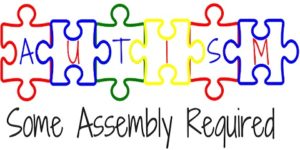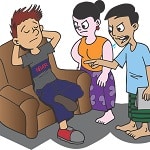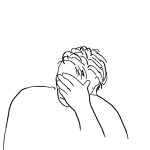I see tons of questions from autism parents on a wide range of topics.
Many of the questions I see however, can be summed up into one category, and that is respect; or lack of respect as the case might be.
Here is why many of our autistic children are disrespectful.
Gratitude and respect are learned behaviors. The characteristics that encompass an autism diagnosis hinder the ability to be able to understand these behaviors. All people are ungrateful and disrespectful to some extent. The gap between neurotypical disrespectful and what you experience with your kids is autism.
That statement was written by my wife Bella.
Autism: Disrespectful Behaviors Explained
What appears to be a disrespectful person with autism is usually a dish full of autism behaviors blended together.
Sometimes additional traits get in the mix and you’re served a 5 course meal with a meltdown for desert!
The truth is, our kiddos usually AREN’T disrespectful…at least not the way they see it.
This is autism. These are some of the behaviors associated with an autism diagnosis.
It isn’t something you’re going to fix. You can improve it, but you can’t fix it.
The best thing you can do is understand it better from their point of view.
Then you teach them how to maintain appropriate social behaviors, while not correcting them for their autism or autistic points of view, which are indeed valid!
To better understand how this works, let’s look at some of the behaviors associated with autism and see how they apply.
At the end, I’ll give a real life example and break it down so you can see how everything goes together.
Disrespectful Behavior Caused By Ego-centrism
One of the behaviors associated with an autism diagnosis is “ego-centrism”.
Our kiddos are typically the center of their own world.
They don’t always take in what is happening around them that involves the rest of the world, only what directly impacts them.
An example would be you getting home from work late because you were involved in a fender bender.
Instead of the expected and socially appropriate response of “Are you OK?”, you might hear something like “Dinner is late!”.
What the heck?!?! Why is this?
Well, you’re obviously OK! You’re home. Mr or Ms Quirky can clearly see that you are here and that you’re OK. That is no longer important to them nor relevant.
They don’t need to hear about the accident as it doesn’t have anything to do with what is most important to them at that moment.
What’s important to them right now is the fact that they are hungry and their routine is messed up!
Behaviors Caused By If/When Thinking
With autism, our kiddos may not understand “If/When” thinking, and we often misunderstand how deep that runs.
I gave an example of this in the video Black Is The New Blue. A general statement is true IF this happens, or a general statement is true except WHEN that happens.
Here’s a deeper look at how this can make a child with autism seem disrespectful.
Our child is given a present or reward when they are behaving well (think haircuts!), and of course presents on Christmas and birthdays.
When someone else gets something unexpectedly and they don’t, that is their frame of reference, so why didn’t they get something too?
I buy Bella a necklace as a surprise for no other reason than the fact that I love her. John wants to know why he didn’t get something too.
It doesn’t matter that he constantly gets new games, new movies, new fishing gear; none of those things were treats or gifts.
It’s unfair that Bella got a gift for no reason and he didn’t. Don’t I love him too? Hasn’t he been well behaved today?
It’s not that he’s ungrateful for those other things.
The fact is his autism doesn’t permit him to correlate all that’s been given to him in the past with his current frame of reference which is that Bella is receiving a gift for no reason and he isn’t.
Disrespectful Behavior Caused By Black And White Thinking
Another behavior of autism is Black and White thinking. It looks like this.
John: “ALL the kids at school get the newest things, and I get nothing.”
Me: “That’s not true John, you got a new video game last week.”
John: “Ya, but Billy got a newer video game today!”
Me (shaking my head and walking away) “Well buddy, if you had everything in the world where would you put it?”
Black and white thinking; it’s this or that, and nothing in between.
It doesn’t matter to him that last week he had the newest game. Last week isn’t NOW. All that matters now is that Billy has the latest game and he doesn’t.
I know this doesn’t sound right or fair, but it doesn’t have to. It sounds disrespectful to us, but not to your child.
THIS is autism! THIS is where many people think a child is spoiled or ungrateful!
The point of this isn’t to judge, it’s to understand what’s going through our kiddos mind.
You can teach them how to react more appropriately, but you can’t change the fact that they have autism, and these are the things they are thinking and how they’re interpreting the world around them.
Disrespectful Behavior Caused By A Lack Of Social Understanding
Perhaps one of the most recognized autism behaviors is a lack of social understanding.
Many people on the spectrum simply don’t recognize rules of etiquette and social norms. They recognize facts.
A lot of times this is closely associated with the black and white thinking I described above.
Here is how this looks disrespectful.
If you hold a door open for someone, you expect them to say thank you. Someone with ASD may not say thank you, not because they’re being rude, but because they just aren’t thankful.
That may sound even more rude, but think about it.
In their mind, they didn’t ask you to hold the door open. They would have been perfectly fine with opening it themselves. They didn’t purposely not thank you, it just never occurred to them that they should based on that line of thinking.
A lack of social understanding can often times be the biggest reason why someone on the spectrum may seem rude or disrespectful.
Society has so many rules. There are so many gray areas. Social cues can come from posture, the tone of your voice, the expression on your face etc…
So many of these simply don’t register with a person who has autism.
Disrespectful Behavior Caused By Literal Thinking
Another autism behavior is literal thinking and fact consideration based upon their literal understanding.
You may have heard a conversation like this:
What do you mean we can’t afford it? Go to the ATM and get the money! Oh, you don’t have enough money in the bank? Then work more or tell your boss to pay you more!
They aren’t being ungrateful or disrespectful. It’s simply how they view things due to their diagnosis.
Literal understanding:
A simple example would be the teacher telling the class to write your name at the top of the paper.
When your kiddo writes “your name”, they aren’t being sarcastic. Their literal thinking led to fact consideration based on their literal understanding. The teacher said “Write your name…”
Here’s a more complex, real life example.
John doesn’t get along with one of his classmates. They get into an argument in class and both get sent to the principals office.
While in front of the principal, John calls the fellow student a stupid idiot. When the principal asks John why he said that, John replies, “My mom told me to never lie.”
He was simply telling the truth as he saw it. This is autism.
Disrespectful Behavior Caused By Problems Communicating
The final behavior associated with autism that I want to cover is communication issues.
One of the key behaviors Dr’s look for when diagnosing autism is problems communicating. Many times, people confuse this with the inability to talk.
That might be the case sometimes, but it goes well beyond that.
One of the things we teach John over and over again is to use his words properly.
John: “Give me an apple!”
Me: “John, are you saying you want an apple?”
John: “Yes”
Me: “Then use your words properly please. You don’t demand an apple, you ask for one.”
John: “May I have an apple right now? And cut it up for me!”
Me: “Oh John” LOL
Of course there are other issues with communication that someone on the spectrum might exhibit.
I am simply showing with easy to understand examples how things like this can lead to the perception of an autistic person seeming disrespectful.
A Real Life Example
Here is a real example of disrespectful behavior that I’ve heard from an autism parent that truly demonstrates how this all works together.
A mom and her autistic son were at a deli.
The customer in front of them was an overweight woman paying for her food. As she was paying for her food, she added a chocolate chip cookie to her order.
The cookies were kept in a glass display case at the counter, and this was the last cookie in there.
The kiddo really wanted a cookie, and saw that this lady was buying the last one so he said to her, “Excuse me, ma’am? That’s the last cookie and I really wanted one. Since you’re overweight I think you should let me have it so you don’t have a heart attack. Can I have the cookie please?”
OH!
What do we see here…besides a mortified mom who now has to profusely apologize for her son?
- Ego-centrism: This kiddo only saw the world around him as it impacted himself. Kudos to him though for recognizing potential health concerns that the lady might have as a result of one more cookie!
- Black and white thinking: She’s older and overweight so therefore shouldn’t have a cookie. I’m still young and fit so it’s OK for me to have a cookie. I’ll ask her for the cookie, problem solved!
- Literal thinking: Being overweight is dangerous for your health. Cookies are unhealthy and cause you to gain more weight. She should not have a cookie. This was his factual, literal understanding of the circumstances.
- Communication issues: Personally when I heard this story, I was actually proud of the kiddo for using good words and being polite (as he saw it). The issue here is communication as it relates to social circumstances. He absolutely did not recognize that what he was saying was rude. He was using polite words like “excuse me” and “please”, and explained his reasoning in a way that made sense,
- Lack of social understanding: I would say this example speaks for itself in this area!
Summary
As I’ve pointed out over and over, we can’t “fix” autism, we can simply try to better understand it, fix OUR perspective and continue guiding our kiddos as best as we are able by looking at things through their eyes.
Most of the time it’s not disrespect, it’s autism!
And keep in mind, we do the same things without realizing it!
When you’re driving behind someone slow, do you take the time to consider WHY they may be driving slowly before tailgating or passing them with a look?
If someone at work gets special recognition and you don’t, are you typically jealous? Do you judge them and think of all the things you’ve done right and then think of all their shortcomings? Worse yet, do you talk about your thoughts to others?
All of us experience many of the same “ungrateful” thoughts and feelings that someone on the spectrum feels, but we are better able to suppress it.
All of us are unintentionally disrespectful, and worse yet even intentionally sometimes.
Again, the difference between neurotypical disrespect and the disrespect that our kids experience is part of what defines autism.
Work with them to teach them better, but don’t judge them and believe that they are wrong or bad for their diagnosis.


